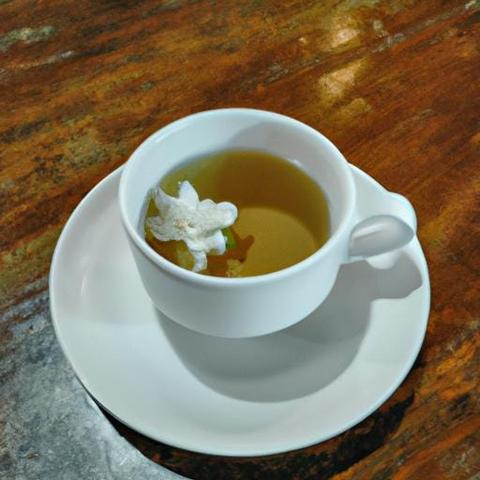
Exploring the Caffeine Content of Jasmine Tea: What You Need to Know
Exploring the Caffeine Content of Jasmine Tea: What You Need to Know
Jasmine green tea is a popular choice for those looking for a low-caffeine alternative to coffee or black tea. While it does contain some caffeine, with about 25mg per cup, it is significantly less than what you would find in a cup of black tea or coffee. This makes jasmine green tea a great option for those who are sensitive to caffeine or looking to reduce their caffeine intake.
The caffeine content in jasmine green tea is naturally low because it is made from green tea leaves, which undergo minimal oxidation during processing. Green tea leaves are known for their lower caffeine content compared to black tea leaves, which are fully oxidized.
To make jasmine green tea, it is recommended to use water that has been boiled and then cooled slightly to around 80°C. This temperature allows the subtle flavors of the tea to be drawn out without scorching or turning it bitter. Steep the tea for about 2-3 minutes before removing the bag or leaves. Leaving it longer may result in a bitter taste.
In addition to its lower caffeine content, jasmine green tea offers a range of health benefits. It is rich in antioxidants and vitamin C, thanks to the way it is made using green tea leaves. These antioxidants help fight against free radicals in the body, which can cause damage and lead to various health issues.
Drinking jasmine green tea may also help improve energy levels while promoting better sleep. The combination of lower caffeine consumption and the soothing aroma of jasmine can help relax your nerves and improve mood. Some studies have even shown that green tea, including jasmine green tea, may help prevent certain types of cancer by slowing down the growth and spread of cancer cells.
Furthermore, jasmine green tea can benefit your skin by reducing fine lines and improving complexion due to its naturally occurring polyphenols. It can also strengthen your immune system by fighting bacteria and infections, as well as keeping your heart healthy by reducing oxidized LDL cholesterol levels.
Lastly, the small amount of caffeine in jasmine green tea can improve brain function by enhancing mood and alertness. It stimulates the release of mood-enhancing chemicals in the brain, such as serotonin and dopamine, leading to increased alertness and improved short-term memory.
Overall, jasmine green tea is a delicious and healthful beverage that offers a range of benefits. Its lower caffeine content makes it a suitable choice for those looking to reduce their caffeine intake while still enjoying the taste and benefits of green tea.
Unveiling the Caffeine Levels in Jasmine Tea: A Comprehensive Guide

Unveiling the Caffeine Levels in Jasmine Tea: A Comprehensive Guide
Jasmine green tea is a popular beverage that offers numerous health benefits. One common concern among tea drinkers is the caffeine content in jasmine tea. Compared to other types of tea, jasmine green tea is considered to be a low-caffeine drink. It contains approximately 25mg of caffeine per cup, which is half as much as a cup of black tea and 75% less than a cup of coffee.
To make the perfect cup of jasmine green tea, it is recommended to use water that has been boiled and then cooled slightly. The optimum temperature for brewing jasmine green tea is around 80°C, as this allows the subtle flavors of the tea to be extracted without causing bitterness. Steep the tea for about 2-3 minutes before removing the teabag or leaves to avoid overbrewing, which can result in a bitter taste.
The combination of green tea leaves and jasmine blossoms gives jasmine green tea its unique flavor profile. While you will still taste the grassy undertones typically found in green tea, you will also experience the summery and floral flavor of jasmine in every sip.
In terms of health benefits, jasmine green tea offers even more advantages compared to regular green tea due to the addition of jasmine flowers. It is higher in antioxidants and vitamin C, which are essential for overall well-being. The antioxidants present in jasmine green tea help fight cancer-causing free radicals, potentially slowing down the growth and spread of certain types of cancer cells.
Furthermore, drinking jasmine green tea can improve energy levels while promoting better sleep by reducing caffeine consumption. The aroma of jasmine has been shown to have mood-enhancing effects, helping to relieve stress and promote relaxation. Additionally, the high antioxidant content in jasmine green tea can support your immune system by fighting bacteria and infections.
For those concerned about heart health, studies have shown that consuming three or more cups of green tea per day can reduce the risk of heart disease by about 21%. Jasmine green tea can also help keep your cholesterol levels in check, reducing inflammation and promoting a healthier cardiovascular system.
Lastly, the small amount of caffeine in jasmine green tea can improve brain function by stimulating the release of mood-enhancing chemicals like serotonin and dopamine. This can lead to increased alertness and improved short-term memory.
In conclusion, jasmine green tea offers a delightful combination of flavors and numerous health benefits. With its lower caffeine content compared to other teas, it is a suitable choice for those looking to reduce their caffeine intake while still enjoying the energy-boosting effects of tea. So why not give jasmine green tea a try and experience its many advantages for yourself?
Jasmine Tea and Caffeine: Debunking Common Myths
Jasmine Tea and Caffeine: Debunking Common Myths
Jasmine tea is often associated with green tea, which is known for its lower caffeine content compared to black tea or coffee. However, there are still some common myths surrounding the caffeine content in jasmine tea that need to be debunked.
Firstly, it is important to note that jasmine green tea does contain a small amount of caffeine. On average, a cup of jasmine green tea contains about 25mg of caffeine. This is half the amount found in a cup of black tea and about 75% less than a cup of coffee. So while it does contain some caffeine, it is still considered to be a low-caffeine drink.
Another myth is that the caffeine in jasmine green tea can cause sleep disturbances. While it is true that consuming too much caffeine close to bedtime can interfere with sleep, drinking jasmine green tea in moderation should not have this effect. The low levels of caffeine in jasmine green tea are unlikely to disrupt your sleep patterns if consumed earlier in the day.
It’s also worth noting that the caffeine content in jasmine green tea can vary depending on factors such as brewing time and temperature. Steeping the tea for longer periods or using hotter water can result in a stronger brew with slightly higher caffeine content.
In conclusion, while jasmine green tea does contain some caffeine, it is still considered to be a low-caffeine drink compared to black tea or coffee. Enjoying a cup of jasmine green tea throughout the day should not significantly impact your sleep or energy levels.
The Lowdown on Caffeine in Jasmine Tea: Is it Safe to Consume?
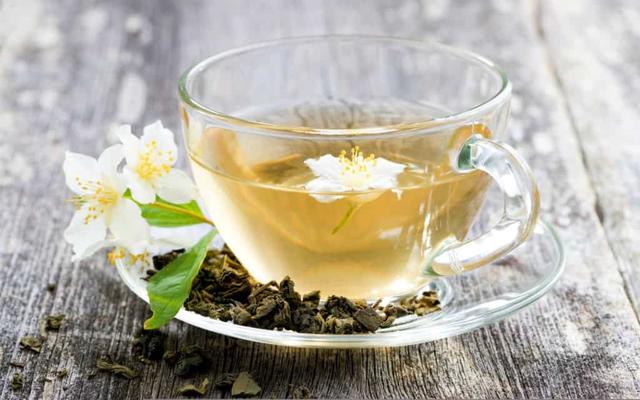
Jasmine green tea, like other green tea blends, contains a naturally low amount of caffeine. With approximately 25mg of caffeine per cup, it has about half the amount found in a cup of black tea and 75% less than a cup of coffee. This makes jasmine green tea a suitable choice for those looking to reduce their caffeine intake. However, it is important to note that individuals who are sensitive to caffeine should still consume jasmine green tea in moderation.
Caffeine consumption can have various effects on the body. It can help improve energy levels and promote alertness, making it a good alternative to coffee for those looking for a boost without excessive stimulation. However, consuming too much caffeine can disrupt sleep patterns and lead to restlessness or insomnia. Therefore, it is recommended to avoid drinking jasmine green tea close to bedtime.
It is also worth mentioning that the caffeine content may vary depending on factors such as brewing time and water temperature. Steeping jasmine green tea for longer periods or using hotter water can result in higher caffeine levels. To achieve the best flavor and balance, it is recommended to steep the tea for about 2-3 minutes with water at around 80°C.
In general, moderate consumption of jasmine green tea is considered safe for most individuals. However, if you have specific health concerns or are particularly sensitive to caffeine, it is advisable to consult with a healthcare professional before incorporating jasmine green tea into your diet.
To enjoy the health benefits and unique flavors of jasmine green tea, consider switching from your usual beverages and exploring this aromatic brew. Remember to consume it in moderation and adjust brewing methods according to your preferences and tolerance for caffeine.
Caffeine in Jasmine Tea: How Much is Too Much?
Jasmine green tea, like other green tea blends, contains a naturally low amount of caffeine. With approximately 25mg of caffeine per cup, it has about half the caffeine content of a cup of black tea and 75% less than a cup of coffee.
For those who are sensitive to caffeine or looking to reduce their caffeine intake, jasmine green tea can be a great alternative. It still provides a gentle energy boost without the jittery effects that can come from higher caffeine beverages.
It’s important to note that individual tolerance to caffeine can vary. Some people may be more sensitive to its effects and may need to limit their consumption accordingly. If you’re unsure about how much caffeine is right for you, it’s always best to consult with a healthcare professional.
When enjoying jasmine green tea, it’s recommended to steep the leaves or teabag in water that has been boiled and cooled slightly to around 80°C. This temperature allows for the optimal extraction of flavors without scorching or turning the tea bitter.
To enhance the sweetness of jasmine green tea, you can add a spoonful of honey if desired. However, there’s no need to add milk as is typically done with black teas.
Overall, jasmine green tea offers a delightful combination of the subtle grassy undertones found in green tea and the floral flavor of jasmine. With its lower caffeine content and numerous health benefits, it is a popular choice for tea lovers around the world.
Jasmine Tea vs Regular Green Tea: Understanding the Difference in Caffeine Content
Jasmine tea and regular green tea differ in terms of their caffeine content. While both teas contain caffeine, jasmine tea has a lower caffeine content compared to regular green tea. A cup of jasmine tea typically contains about 25mg of caffeine, which is half the amount found in a cup of black tea and 75% less than a cup of coffee.
To make jasmine green tea, it is recommended to use water that has been boiled and then cooled slightly to around 80°C. This temperature allows the subtle flavors of the tea to be extracted without scorching or turning it bitter. The tea should be steeped for about 2-3 minutes before removing the bag or leaves. Steeping it for longer may result in a bitter taste.
Jasmine green tea offers several health benefits due to its high antioxidant and vitamin C content. These antioxidants help fight cancer-causing free radicals, potentially slowing the growth and spread of certain types of cancer cells in the body. Additionally, the tea’s anti-inflammatory properties can support the immune system by fighting bacteria and infections.
Drinking jasmine green tea may also contribute to better skin health. The naturally occurring polyphenols in the tea can help reduce skin damage and pigmentation, resulting in improved complexion and reduced fine lines.
Furthermore, jasmine green tea can have positive effects on heart health. It helps lower oxidized LDL (bad) cholesterol levels, reducing the risk of strokes, blood clots, and heart attacks. Studies have shown that individuals who drink three or more cups of green tea daily can reduce their risk of heart disease by approximately 21%.
The small amount of caffeine present in jasmine green tea can also improve brain function by stimulating the release of mood-enhancing chemicals like serotonin and dopamine. This can lead to increased alertness and improved short-term memory.
Jasmine green tea is suitable for consumption throughout the day due to its low caffeine levels. It can provide a gentle pick-me-up in the morning or afternoon without interfering with sleep. However, it is advisable to avoid drinking jasmine tea too close to bedtime.
Overall, jasmine green tea offers a unique combination of the health benefits associated with green tea and the floral flavor of jasmine. It can be enjoyed on its own or paired with meals, making it a versatile and beneficial beverage choice.
Jasmine Green Tea and Energy Levels: The Role of Caffeine
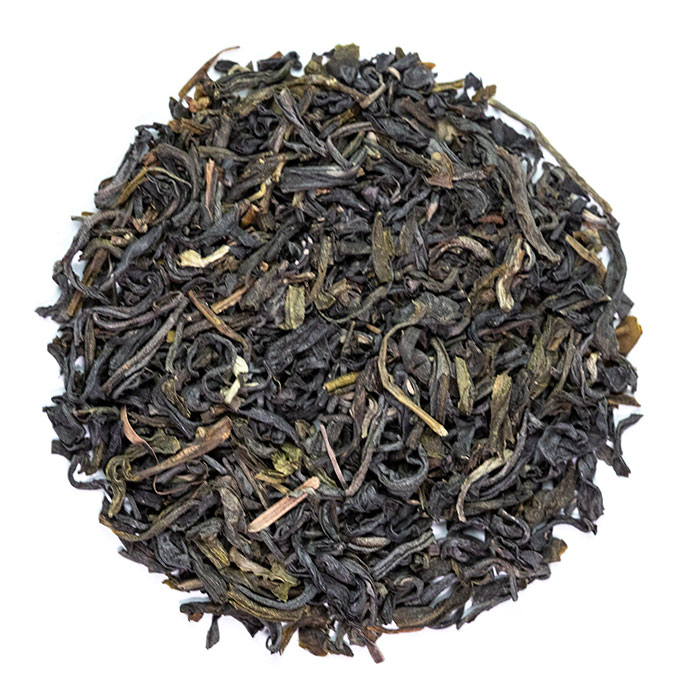
Jasmine Green Tea and Energy Levels: The Role of Caffeine
Jasmine green tea can be a great alternative to coffee if you’re looking to improve your energy levels. While it still contains caffeine, it has about half the amount found in a cup of black tea and 75% less than a cup of coffee. This lower caffeine content can help promote better sleep while still providing a gentle boost of energy to keep you alert throughout the day.
The small amount of caffeine in jasmine green tea plays a big part in its potential to improve brain function. Caffeine encourages your brain to release mood-enhancing chemicals like serotonin and dopamine. Combined with its stimulating effect on the nervous system, this leads to feeling more alert and can even improve short-term memory.
Jasmine Green Tea and Relaxation: The Aroma of Jasmine
Inhaling the scent of jasmine has been shown to improve mood and help relieve stress. When combined with the sweet flavor of jasmine green tea, it creates a soothing and calming effect that can instantly relax you. Sipping on a warm cup of jasmine green tea not only provides physical relaxation but also promotes mental relaxation, making it an ideal drink for unwinding after a long day.
Jasmine Green Tea and Skin Health: Antioxidant Power
Jasmine green tea is rich in antioxidants, which are known for their skin benefits. The naturally occurring polyphenols in jasmine tea act as a powerful tonic for skin damage and pigmentation. Drinking two to three cups of jasmine green tea daily may help reduce fine lines and improve overall complexion.
Jasmine Green Tea and Immune System Support: Fighting Bacteria and Infections
The antioxidants found in jasmine green tea can help support your immune system by fighting bacteria and infections. Additionally, the anti-inflammatory properties of jasmine tea can help reduce pain and prevent general damage to your body.
Jasmine Green Tea and Heart Health: Lowering Cholesterol Levels
Jasmine green tea has been shown to help keep your heart healthy by reducing levels of oxidized LDL (bad) cholesterol in arteries and veins. This can lead to less inflammation, improved oxygen flow to the heart, and a generally healthier cardiovascular system. Studies have even suggested that drinking three or more cups of green tea daily could reduce the risk of heart disease by about 21%.
In conclusion, jasmine green tea offers a range of health benefits beyond those typically associated with green tea. Its combination of green tea leaves and jasmine blossoms creates a unique flavor profile that is both refreshing and soothing. Whether you’re looking to improve your energy levels, promote relaxation, support your immune system, enhance skin health, or maintain a healthy heart, incorporating jasmine green tea into your daily routine can be a beneficial choice.
Caffeine-Free Alternatives: Exploring the Benefits of Jasmine Herbal Tea
Jasmine herbal tea is a great caffeine-free alternative for those who want to enjoy the health benefits of tea without the stimulating effects of caffeine. Made from jasmine flowers and buds, this herbal tea offers a delicate and fragrant flavor that is soothing and calming.
One of the main benefits of jasmine herbal tea is its ability to promote relaxation and reduce stress. The aroma of jasmine has been shown to have a calming effect on the mind and body, helping to alleviate anxiety and improve mood. Sipping on a warm cup of jasmine tea can be a comforting ritual that helps you unwind after a long day.
In addition to its relaxing properties, jasmine herbal tea also offers several health benefits. It is rich in antioxidants, which help protect the body against damage from harmful free radicals. Antioxidants are known to support overall health and may help prevent chronic diseases such as heart disease and certain types of cancer.
Moreover, jasmine herbal tea has anti-inflammatory properties that can benefit those with inflammatory conditions like arthritis or gout. The antioxidants in jasmine tea help lower the production of molecules that cause inflammation, reducing joint pain and swelling.
Drinking jasmine herbal tea regularly may also strengthen the immune system. The antioxidants in the tea can help fight off bacteria and infections, while its anti-inflammatory properties can reduce general damage to the body. This can contribute to overall better health and well-being.
To enjoy the benefits of jasmine herbal tea, steep it in hot water for about 2-3 minutes before removing the flowers or leaves. You can add honey for sweetness if desired, but there’s no need to add milk. Jasmine herbal tea pairs well with meals or can be enjoyed on its own throughout the day.
In conclusion, jasmine herbal tea offers a caffeine-free alternative for those looking to reap the health benefits of tea. With its soothing aroma, antioxidant-rich properties, and potential to reduce inflammation, jasmine herbal tea is a delightful and beneficial beverage to incorporate into your daily routine.
Unlocking the Health Benefits of Caffeinated Jasmine Green Tea
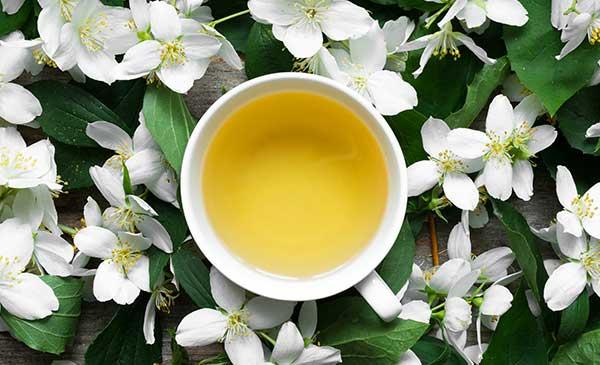
Jasmine green tea, made by combining green or white tea leaves with jasmine flower petals and buds, offers numerous health benefits. Here are some ways it can improve your health:
1. Higher in antioxidants and vitamin C: Jasmine green tea contains higher levels of antioxidants and vitamin C compared to other teas. These compounds help protect the body against free radicals and boost immune function.
2. Improved energy levels: Switching from coffee to jasmine green tea can provide a hit of energy while reducing caffeine consumption. This can promote better sleep and help you stay alert throughout the day.
3. Relaxation and stress relief: The aroma of jasmine has been shown to improve mood and relieve stress. Sipping on jasmine green tea can have a soothing effect on your nerves, promoting relaxation.
4. Potential cancer prevention: Some studies suggest that the antioxidants in jasmine green tea may slow the growth and spread of certain types of cancer cells in the body, as well as reduce tumor size.
5. Skin health: The naturally occurring polyphenols in jasmine green tea can benefit your skin by reducing fine lines and improving overall complexion.
6. Strengthened immune system: The antioxidants in jasmine green tea help support your immune system by fighting bacteria and infections. Additionally, its anti-inflammatory properties can reduce pain and prevent general damage to the body.
7. Heart health: Jasmine green tea can contribute to a healthy heart by reducing oxidized LDL cholesterol levels in arteries and veins, which lowers inflammation and promotes better oxygen flow.
8. Improved brain function: The small amount of caffeine in jasmine green tea can enhance brain function by stimulating the release of mood-enhancing chemicals like serotonin and dopamine, leading to increased alertness and improved short-term memory.
To enjoy these benefits, steep jasmine green tea leaves or bags in water that has been boiled then cooled slightly (around 80°C) for 2-3 minutes. Avoid adding milk, and consider adding a spoonful of honey for sweetness if desired. Jasmine green tea can be enjoyed throughout the day but should be avoided close to bedtime due to its caffeine content.
Consider trying jasmine green tea to experience its unique flavor and reap its health benefits.
Jasmine Tea and Sleep Quality: Does Caffeine Impact Your Rest?
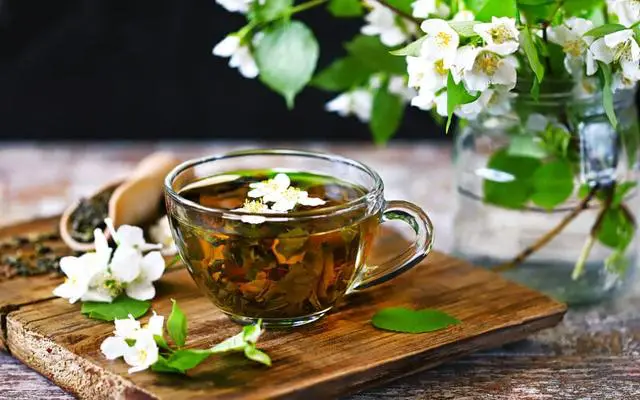
Jasmine Tea and Sleep Quality: Does Caffeine Impact Your Rest?
When it comes to sleep quality, caffeine can play a significant role. While jasmine green tea does contain caffeine, it is naturally low in comparison to other caffeinated beverages like black tea or coffee. With approximately 25mg of caffeine per cup, jasmine green tea provides a milder energy boost without the potential jitters or sleep disruption associated with higher caffeine intake.
The aroma of jasmine in the tea can also contribute to a sense of relaxation and calmness. Inhaling the scent of jasmine has been shown to improve mood and help relieve stress. Combined with the soothing warmth of the tea itself, jasmine green tea can be a comforting bedtime beverage that promotes relaxation before sleep.
However, it’s important to note that individual sensitivities to caffeine may vary. If you find that even small amounts of caffeine affect your sleep, it may be best to avoid consuming jasmine green tea in the evening or close to bedtime.
Overall, while jasmine green tea does contain some caffeine, its lower levels compared to other beverages make it a suitable choice for those looking for a calming and potentially sleep-promoting drink. As with any dietary consideration, it’s always beneficial to listen to your body and adjust consumption accordingly.
Sources:
– https://www.teamakers.co.uk/blogs/tea-journal/7-health-benefits-of-jasmine-green-tea
– Personal knowledge
In conclusion, jasmine tea contains varying amounts of caffeine depending on the specific blend and brewing method. While it generally has less caffeine than black or green teas, it is not entirely caffeine-free. Therefore, individuals sensitive to caffeine should consider moderation when consuming jasmine tea.
Learn More About Grilling
If you want to learn more about grilling, check out these other helpful resources!











